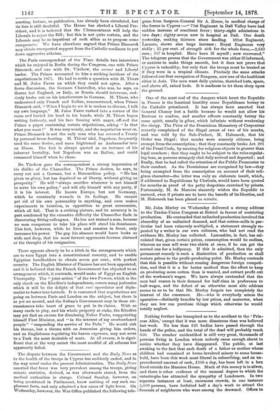Dr. Virchow gave the correspondent a strong impression of his
dislike of the Chancellor. The Prince desires, he says, to carry out not a German, but a Bismarckian policy. "He has given us glory, but has deprived us of liberty, without giving us prosperity." He will "always sacrifice whatever is not himself to serve his own policy," and will ally himself with any party, if it is his interest. He knows Europe, but not Germany, which he constantly wounds in its feelings. He cannot get rid of his own personality in anything, and even makes experiments in taxation, in opposition to great economists, which all fail. That is a striking picture, and its accuracy is in part confirmed by the excessive difficulty the Chancellor finds in discovering fitting colleagues. He has not trained a man, because no man competent to take his place will stand his dominance. This fact, however, while he lives and remains in front, only increases his power. The gap his absence would leave looks so wide and deep, that his most fervent opponents become alarmed at the thought of his resignation.






























 Previous page
Previous page